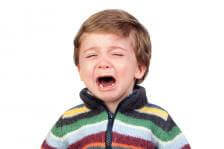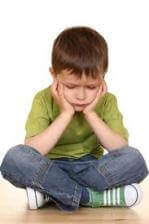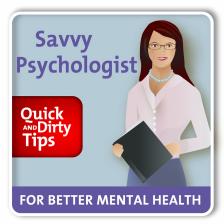Should You Take on Bad Parenting in Public?
While parenting decisions are generally best left to the parents, what happens when a parent does something to their child that makes your hair stand on end? This happened to the Savvy Psychologist recently. Here’s the story, plus 5 facts to help you decide with confidence whether to take action in a similar scenario.
Ellen Hendriksen, PhD
Listen
Should You Take on Bad Parenting in Public?
Last Sunday, I was at my local drugstore looking at birthday cards for my dad and sister-in-law. Both my boys were with me—my 2-year-old in a carrier on my back and my 5-year-old systematically working his way through all the cards that play tinny electronic music when opened.;
About 10 feet from us was another parent-son pair. The son was tall but clearly young, maybe 13, probably just coming off an early-teen growth spurt. This is what I heard:
- Son: I found one she might like.
- Dad: [withering sarcasm, not looking at the son] Congratulations.
- Son: Do you think she’d like it?
- Dad: [angry, almost spitting] Can’t you figure that out? Don’t ask me stupid questions.
- Son: What about this one?
- Dad: [Ripping it from son’s hand] For whom? If you’d focus, which you haven’t done yet today, we’d have been done with this a long time ago. [Something about the way he stressed “whom” made me think they’d just had a what-are-you-stupid conversation about grammar].
- Son: For Tina. She’ll be seven.
- Dad: Well, whoop-de-do.
- Son: Don’t put it back! Please, don’t put it back!
- Dad: [Putting it back.] I can’t believe you. Stop bothering me. [Pulls out phone and stalks off].
During the exchange, I was facing the birthday cards, but I certainly couldn’t see them. I could feel myself getting hot and sweaty and my heart was pounding. There was something about the nakedness of their exchange that made it clear this wasn’t a one-time argument.
Now, we’ve all seen hissed, heated exchanges in public places. People get angry; people argue. However, most people try not to make a scene. They make an effort to stifle their baser behaviors. But with this dad, it seemed to be normal, so much so that he forgot it wasn’t normal to others.

To be sure, the dad wasn’t hitting or cursing his son. He wasn’t even yelling. His conduct wasn’t illegal, but it sure wasn’t Okay. Plus, if he’s doing this to his son in the greeting card aisle, I shudder to think what he could be doing at home.
Understandably, it’s really difficult to get accurate numbers on child abuse and neglect, but a 2013 national epidemiological study in JAMA Pediatrics reported that almost 14% of kids experienced maltreatment by a caregiver in the last year, and 25% of kids had experienced maltreatment by a caregiver at least once in their lifetime. Maltreatment, of course, isn’t just strict discipline or getting grounded—it means physical, sexual, or emotional abuse or neglect.
See also: Speak Up Against Abuse
Child abuse and neglect crosses all lines: money, race, or neighborhood doesn’t matter. Likewise, while abuse by strangers happens, most abusers, sadly, are family members or close friends.
Usually, the talking doesn’t start until after the fact: a baby is left in a car, a child is discovered in a meth lab, or a teen goes on a shooting spree. Hindsight is 20/20 and we ask, “Why didn’t anyone say anything?”
So, what if you’re faced with this sort of situation where you’re merely a witness – what would you do? What should we do? Here is what I did, for better or worse:
After the dad stalked away with his phone, I sidled up to the boy and touched his arm, which he shrank away from [my heart broke a little at this]. I said “You’re not doing anything wrong.” He met my gaze, nodded really quickly, and then stepped away.
Then, the dad came back. A similar conversation played out again between the two of them, but I was too outraged to register exactly what was said. I turned my whole body to face the dad, who was about 6 feet away, but I didn’t say anything. I looked at him for about 3-4 seconds. Not a dirty look, but a look of “I see you. I see what you’re doing.”
Some people will argue this was none of my business, that I overstepped, that I stupidly endangered myself or my kids by engaging, or perhaps even endangered the boy, who now has to bear the brunt of his dad’s annoyance at me. Others will argue I should have done more.
The dad didn’t look at me, but crossed his arms and said to the air, “Oh, of course it’s my fault. It’s all my fault.” Then he pulled out his phone again and walked away. I turned to the kid and asked, “Is he always like that?” But he was looking at his own phone and didn’t answer. I couldn’t tell if he didn’t hear me or didn’t want to talk to me. I’m guessing the latter.
Less than a minute later, Dad came back and they both left. It took me about 10 minutes before I could focus enough to read any of the cards my 5-year-old put in my hands.
A day later, I continue to struggle with this. Some people will argue this was none of my business, that I overstepped, that I stupidly endangered myself or my kids by engaging, or perhaps even endangered the boy, who now has to bear the brunt of his dad’s annoyance at me. Others will argue I should have done more. Hopefully, some will agree that as rational adults, we should stand up for kids being bullied by their own parents.
If I hear about child abuse within the four walls of my office, as a mental health professional, I am legally mandated to call Child Protective Services or the police.
To report, “reasonable suspicion” is all I need, and mandated reporters like me are immune to legal consequences—like getting sued—if we’re lucky enough to be wrong. But if I don’t report, I get fined, go to jail, or both. When I’m at work, the rules are clear.
But when I—or you—are at the drugstore, it gets murky……

On the other hand, my kindergartener is being taught at school to stand up to kids who are being mean to him or others. He’s been taught to say, “That’s not Okay with me,” or “Stop it, he doesn’t like that.”
Now, if a kindergartener is expected to stand up for kids being bullied, I say adults can be held to at least the same standard. The media tells us not to judge parents, but there’s a difference between judging parents for harebrained decisions versus protecting kids from abuse, especially when the power differential is as wide as between parent and child.
See also: Speak Up Against Abuse
I hope you never need the following, but here is some information to know before you wade into the fray:
Fact #1: The difference between abuse and discipline is actually pretty clear. Abuse is unpredictable: there are no rules, or rules get made up or changed at the parent’s whim. Discipline is about teaching the child and is driven by consistency and concern for the child’s growth and development, while abuse is about having power and control over the child and is driven by anger.
Fact #2: You probably won’t have the whole story, and that’s Okay. You don’t have a crystal ball. You can’t know the full back story, nor can you see the future outcome of the situation, and that’s fine. Your only goal is to offer—in the moment—help, not reprimand, to the parent, child, or both.
Fact #3: It’s hard to speak up. “It’s none of my business,” “I’m interfering,” “I don’t want to get involved,” “It’s not my place to say something.” These statements come from a place of wanting to be appropriate and to stay safe, two completely understandable feelings.
But they also come from a place of fear. We’re afraid of being wrong, afraid of being labeled as meddlesome or overreacting, but most of all, we’re afraid of having the anger already on display directed at us.
Imagine yourself acting with empathy and courage the next time you’re faced with abuse, and maybe you’ll surprise yourself.
Two-time Nobel Prize nominee, Dr. C. Henry Kempe, the pediatrician who helped the medical community recognize child abuse in the early 1960s, once said he would rather apologize to a parent because he made a mistake about saying something, than apologize to a brain-damaged child because he did not.
It’s hard to think clearly when you’re scared. So don’t kick yourself if you inadvertently go into blinders mode. But imagine yourself acting with empathy and courage the next time you’re faced with abuse, and maybe you’ll surprise yourself.
Fact #4: Everyone has a voice. If you see suspicious bruises on your child’s friend or hear sounds that give you goose bumps from the apartment next door, everyone, no matter your professional or personal role, is allowed to report suspected child abuse.
Reporting to CPS or the police often feels too extreme or “official,” but calling an agency for advice doesn’t have to feel like tattling. You could also call a school guidance counselor, a religious leader, or a physician.
If you suspect it, others probably suspect it, too. Don’t let a child slip through the cracks. In California, where I live, individuals just trying to do the right thing can make anonymous reports. Your state may have a similar law.
Fact #5: If you have time, observation is your best information. If you’re in a position where you have regular contact with a child you’re concerned about, like a neighbor or your child’s friend or teammate, and you don’t have to make a snap decision about what to do in the moment, your best source of information is not necessarily what a child says, but how he or she behaves. Because they can’t stop maltreatment, kids who experience abuse or neglect bend over backwards to invent ways to get them through daily life – from spacing out to acting out to withdrawing to extreme people pleasing. If you suspect, you should of course listen to what the child says, but more importantly, watch how he or she behaves.
Back at the drugstore, here is what I thought about also doing, but didn’t work up the nerve to do:
While the dad was around the corner, I thought about asking the son, “Are you safe? Does he ever hit you?” I wish I had said that, but I didn’t.

I also thought about saying, “It’s not your fault, no matter what he says.” I really wish I had said that. But I didn’t. Although since that afternoon, I’ve thought it over and over again, eyes squeezed shut. Through sheer force of will, I hope the kid hears me through time and space.
As for the dad, after hours of mentally fuming through angry, cutting comments, I thought of this, which is neither angry nor cutting, but I’m sure has a heartbreaking answer:
“How long have you been in so much pain?”
I didn’t say that, either. But I wish I had.
Disclaimer: All content is strictly for informational purposes only. This content does not substitute any medical advice, and does not replace any medical judgment or reasoning by your personal health provider. Please always seek a licensed physician in your area regarding all health related questions.
Child abuse image courtesy of Shutterstock.

